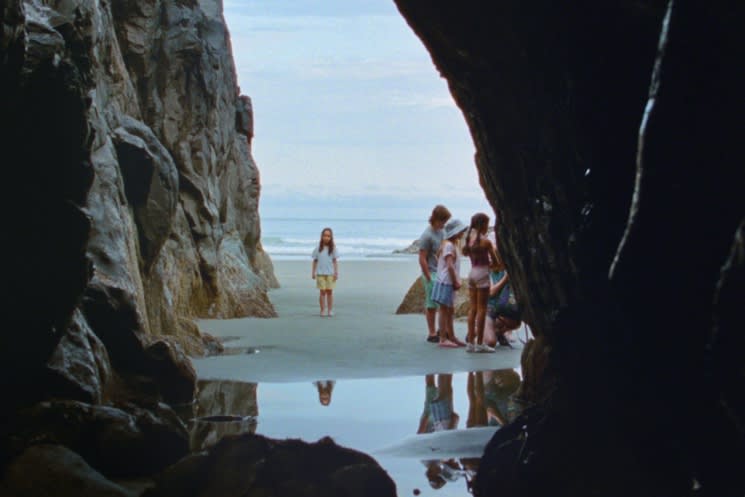Canadian director Meredith Hama-Brown contends with a lot in her feature film debut. The breakdown of a marriage, mixed-race relationship issues, young sibling dynamics, the grief of losing a parent, navigating casual racism in adulthood and childhood, the pressures of parenthood, and the struggles of peer pressure as a preteen — Hama-Brown truly throws everything and the kitchen sink (or in this case, a broken closet) into Seagrass.
At first brush, the feel is frenetic and unfocused, with no one issue being served properly. But, when taking a step back, it becomes clear that Seagrass's lack of focus is merely a snapshot into the chaos a family can endure in one summer, as opposed to a tidy film narrative.
Set in the summer of 1994, Judith (played by Ally Maki), her husband Steve (Luke Roberts) and their daughters, Stephanie (Nyha Breitkreuz) and Emmy (Remy Marthaller), pile into a car on their way to a remote island in British Columbia. The family is attending a self-development retreat, with the parents attending counselling sessions while the kids play with other children at daycamp.
All of the themes and narratives swirling throughout Seagrass revolve around Judith. Feeling her marriage slipping away, she pushes Steve beyond his comfort to engage in group therapy sessions, as she also attempts to comfort her kids' grief (especially Emmy's) over losing their grandmother, while battling her own loss.
Judith's problems are compounded when a fellow Asian, Pat (Chris Pang), approaches her after a day's session. It begins with Pat innocuously speaking to Judith in Japanese, to which she's unable to respond, continuing with Pat asking Judith about her family's history into Canada, including whether they were imprisoned in an internment camp. Confronted with how little she knows about her family lineage and her heritage, Judith's insecurities around her identity are mirrored in Stephanie and Emmy's own self-doubts during an already tempestuous time.
Maki instills in Judith a boiling frustration and anger that at times simmers just underneath the surface, and at others bubbles over into a scalding outburst. Compassion and sympathy are found at the core of Maki's performance, which is contrasted and elevated vividly by Roberts's Steve, a man at the end of his rope, unsure of what else he can do.
The film's two young actresses create a space for themselves that encompasses a perfect balance between mature confidence and youthful uncertainty. Breitkreuz and Marthaller have such a natural sisterly dynamic between them, one of the first things I looked up after watching Seagrass was whether the two actresses were actually related. Individually, they both excel as well — Breitkreuz paints herself as the good girl tempted by the mean girl in the most relatable fashion, and Marthaller's purity will send daggers straight through the heart.
Along with cinematographer Norm Li, Hama-Brown offsets the natural beauty of BC's Gabriola Island with an eerie sensibility that makes Seagrass feel like a horror film ripe with Dutch angles. The grain of the 35 mm film used adds to the '90s setting and produces an unrefined atmosphere akin to a home video, as if we've stumbled upon these private moments.
For those of us who grew up under similar circumstances in a similar time, many of the instances and beats will be familiar. By the end of the film, nothing feels resolved or achieved — in keeping with the film's general impression that, unlike movies, life's great questions and issues rarely resolve themselves in one summer.
'Seagrass' Embraces the Chaos of Family Dynamics
Directed by Meredith Hama-Brown
Starring Ally Maki, Luke Roberts, Nyha Breitkreuz, Remy Marthaller, Sarah Gadon, Chris Pang

Photo courtesy of Game Theory Films
BY Rachel HoPublished Feb 21, 2024